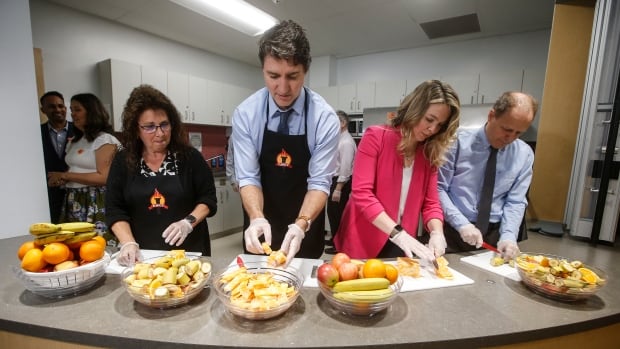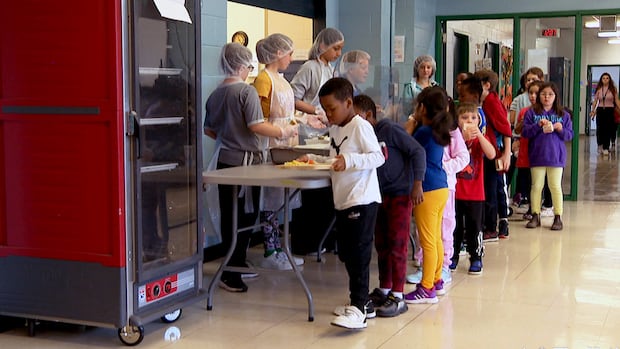Manitoba Premier Wab Kinew’s NDP government is set to become the second province to sign on for a slice of the $1 billion federal school food program.
Finance Minister Chrystia Freeland and Social Development Minister Jenna Sudds are expected to join the premier Friday morning to announce an agreement that will see over $17 million in additional federal funding added over the next three years to the $30 million the province already has budgeted for its “universal school nutrition program.”
Despite the name, the Manitoba program launched on Sept. 5 isn’t quite universal yet. It’s stitching together and supplementing what has been a patchwork of meal and snack programming across the 37 school divisions in Manitoba. The provincial government set aside $6 million for 50 schools in communities it described as having “high socio-economic need.”
Sudds said the initial $3.8 million in federal funding going to high-needs areas this fiscal year will help deliver food to an estimated 19,000 kids who would not otherwise have access to school breakfast, lunch or snack programs.
“Now those parents will not have to have that worry and those kids can focus on being kids, right? And focus on learning,” the minister told CBC News ahead of Friday’s official announcement.
Most of the funding will go to purchase food, Sudds said. But schools can also use the federal money to buy equipment like refrigerators or toasters, or renovate in-school kitchen facilities. It could also cover the cost of hiring more staff.
One of the federal conditions for this funding is that provincial investments do not decrease as a result.
“We want to see them maintained, if not increase, over time, and that’s a commitment that the Manitoba government is very transparent and excited about,” Sudds said.
Programs vary across schools, regions
Newfoundland and Labrador was the first province to sign on for federal funding on Sept. 4. Three provinces — British Columbia, Saskatchewan and New Brunswick — are in the middle of election campaigns, so federal talks with those jurisdictions are on hold.
The National School Food Policy released by Sudds’ department earlier this year laid out general criteria — but not specific requirements — for the types of school meal or snack programs that can receive federal funding.
The policy says programs must be “universally accessible” and “culturally appropriate.” It also includes language that prioritizes “local food sources” and “sustainability,” although individual communities are free to define what that means for their kids.
The federal policy states that the food served must be in line with federal nutrition guidelines and requires that participating provinces report back to the federal government with their implementation plans and results.
“Ultimately, it will be the decision of the province and the school boards, as they move forward, for what those priorities in their local food systems look like,” Sudds said. “Each province is unique, each community is unique.”
Unlike American school lunch programs — which fall under the purview of the U.S. Department of Agriculture and have helped subsidize American farmers for decades — there’s nothing in the federal policy requiring schools to serve food from local supply chains. Sudds said she hopes that schools connect what they serve students with what they’re teaching them about the food grown, caught and processed in their communities.
Parents and advocates are urging provincial governments to speed up talks on joining the new federal school-meal plan announced earlier this year. The plan provides $1 billion over five years to serve school meals across the country, but so far, only Newfoundland and Labrador have signed on.
The NDP government in Manitoba and the Liberal government in Newfoundland and Labrador are “aligned” with the federal government’s vision, Sudds said.
She also acknowledged that some provinces are “harder to deal with than others.” That doesn’t mean agreements with conservative-leaning governments aren’t also possible in the coming months, Sudds added.
“Most recently, [Ontario] Premier Ford has really showed his enthusiasm and has been speaking about getting on to the national school food program,” she said.
Separate efforts are underway to reach agreements with Indigenous governments to allocate some of the federal funding to schools that fall outside of provincial education systems.
Federal Conservatives dismissive, future uncertain
Sudds said she hopes more deals can be reached with additional jurisdictions over the course of this school year. She may be running out of time.
The minority Parliament in Ottawa has turned perilous for the Liberals. Even if Prime Minister Justin Trudeau’s government survives upcoming confidence votes, the next fixed date for a federal election is in the fall of 2025.

Every new agreement reached with a province or territory serves to solidify school food programming as part of Canada’s social safety net. If all jurisdictions across Canada sign on, the $1 billion allocated in the 2024 federal budget to roll out over the next five years could feed up to 400,000 school kids who don’t currently have access to food provided by their schools.
“This should not be political, right?” Sudds said. “We hear in the House of Commons [Conservative Leader] Pierre Poilievre refer to this as ‘bureaucracy.’ And I have to tell you how incredibly frustrating it is to hear someone speak about providing food to kids as ‘bureaucracy.'”
Poilievre has dismissed the program as something that “costs millions, but hasn’t fed a single meal.” He also has attacked the federal Liberals frequently over the cost of groceries and the rise in food bank usage. In December of last year, Conservatives voted against a private member’s bill that would have established a national framework for a school food program.
“I feel the urgency every day of making sure that we get this done.” Sudds said. “I also have a lot of fear about what a federal Conservative government would do.”
When asked how this urgency dovetails with word this week that four of her cabinet colleagues will not run again, Sudds said her “focus, honestly, is delivering.”
When asked if she’s running again, Sudds said, “I sure am.”



